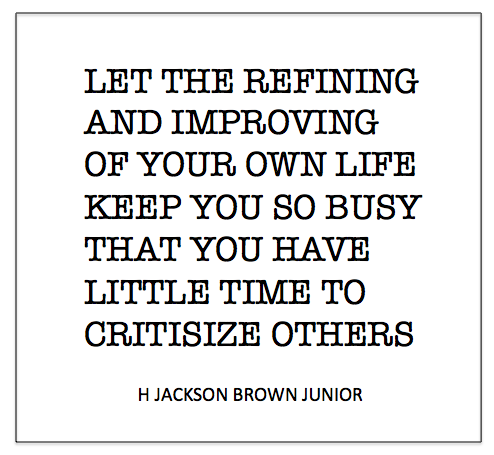Do you ever find yourself caught in the grasp of criticism?
Whether it’s criticism of a friend, colleague, or even someone you don’t know that well, it can be easy to judge others for their faults while we gloss over our own.
Criticism feeds the ego
When we criticize another person, we are essentially casting judgment. And by judging, there is a tendency to make ones own self feel superior in the process. This process is usually led by the ego and in my experience, where the ego is involved, frustration usually follows.
The question to ask is why we feel the need to feel superior in the first place? Of all the successful, iconic and inspiring people that I’ve met and studied over the years, they have all shown one common trait: an air of humility. They don’t need to criticize others to make themselves feel superior, because they are already confident in themselves and their own abilities.
What does criticism achieve?
It can be so easy to look at others and pick apart their faults, but what does this really achieve? Or is it simply a diversion away from our own self-development and personal growth?
Don’t get me wrong – there can be something addictive about pulling to pieces someone else’s worst faults and negative aspects of their personality, but how is this really helping that person?
Can we ever criticize knowing the whole story?
What’s more, when we criticize others it’s rare that we will ever really know the full story. We won’t know why other people behave in such a way, what childhood situations may have contributed to their behavior and what other factors are involved. So, we’re essentially judging based on misinformation.
For this reason, it’s best not to judge at all, but instead to offer support or simply keep quiet and get on with the job of perfecting our own lives.
Criticism is essentially negative thinking
If you think about it, criticism is negative thinking in action. When we focus on the negative qualities of other people, we are allowing negative thoughts to enter the brain. The more you criticize, the more comfortable your mind becomes with negativity and the more this starts to spill over into other areas of your life. Before you know it, you’re one of those negative types and your life becomes a self-fulfilling prophecy.
If you know that negative thinking is something that you struggle with, this could be a good opportunity to make a concerted effort to criticize less and train your mind to only focus on helpful, positive thoughts instead of negative ones.
Does criticism bear solutions?
How often does criticism lead to real solutions? And how often do we approach the offenders with an impartial offering that will actually help their situation? Or do we simply judge behind backs, safe in the knowledge that our own righteousness will never be uncovered?
At this point it’s important to make clear the difference between criticism and impartial observation. Criticism usually takes the form of negative analysis of another person’s behavior and is rarely useful, whereas impartial observation includes a neutral analysis of another persons behavior and often comes with solutions. Another key differentiator is that criticism carries with it an air of superiority and emotional undercurrents (such as anger and frustration), whereas impartial observation remains neutral and humble in approach.
Let’s make a decision to criticize less
I’ve made a decision this year to criticize others less and to opt for impartial observation, but only where I feel a solution can be offered. Instead I will work on my own personal growth and attempt to leave judgment of others behind.
The things is – nobody’s perfect. We all have our own challenges to work on and what we really need is a helping hand from those around us, not talking behind backs. Plus, if you have ever met someone who is truly comfortable in their own skin, then you’ll know that they practice humility and this is something far more beneficial to work on, instead of judgment.
Simple Life Strategy: 6 Steps to Reduce the Negative Effects of Criticism
1. Pay attention to the next time you find yourself talking about someone else – are you speaking favorably or are you picking at faults?
2. Consider if you have all of the information required to cast judgment?
3. Assess if you are offering a solution out of this, or are you just letting off steam to feed your own ego?
4. Are you feeding negative thoughts? What impact will this have on other areas of your life?
5. Choose to invest your time in your own personal growth instead of channeling energy into uncovering other people’s perceived faults
6. Opt for humility over self-righteousness – no one likes a know it all!
If you enjoyed this article, please share it with others.
More Simple Life Strategies:
-
Wisdom from Richard Branson
-
How to Make the Most of a Crappy Situation
-
How to Unlock the Genius Within
Not loving your day job? Get my most popular, FREE online training here: My 3 Step process To Find A More Meaningful Career.
Join 108,000 beautiful souls on the Simple Life Strategies Facebook page to get access to articles before anyone else!


